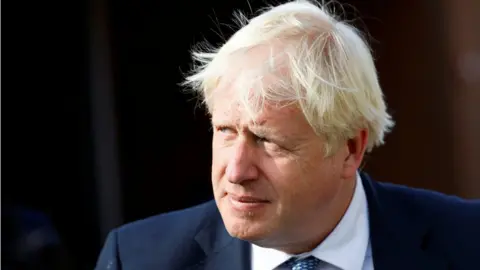No 10 denies cover-up over Boris Johnson Covid WhatsApps
 PA Media
PA MediaDowning Street has denied accusations of a cover-up over the release of former Prime Minister Boris Johnson's WhatsApp messages to the Covid inquiry.
The inquiry has demanded the unredacted messages, along with diaries and notebooks, are handed over by Thursday.
The Cabinet Office has argued some of the material is not relevant.
But opposition parties say it should be disclosed in full so the inquiry can decide what is relevant to its investigations.
Mr Johnson is among those who will give evidence to the inquiry, which is due to start hearings in two weeks.
The inquiry has extended a deadline for the material to be handed over from 16:00 on Tuesday to 16:00 on Thursday.
The material includes 24 notebooks with contemporaneous notes, as well as WhatsApp messages between Mr Johnson and cabinet ministers, advisors and senior civil servants.
Announcing the extension, the inquiry revealed it had been told the Cabinet Office did not currently have the WhatsApp messages or notebooks in its possession.
If the department still does not have the material by Thursday, the inquiry said it must instead provide its correspondence with Mr Johnson over the issue.
Cabinet Office sources would not confirm what material they do not currently have.
A spokesman for Mr Johnson said he had "no objection to disclosing the material to the inquiry".
He said Mr Johnson had cooperated with his Cabinet Office legal team, who had "access" to all the material.
The BBC has been told the team visited Mr Johnson's office to inspect the notebooks.
Mr Johnson has since stopped cooperating with his government-appointed lawyers and is appointing his own.
The spokesman said Mr Johnson wrote to the Cabinet Office last week saying he was not aware of any "instructions or requests from the Cabinet Office regarding this material".
"The decision to challenge the inquiry's position on redactions is for the Cabinet Office," the spokesman added.

How private are ministers' WhatsApps?
Many of us now use WhatsApp to communicate with work colleagues - and government ministers and MPs are no different.
What is different, is that ministers are often making life or death decisions.
And their discussions, however private they may feel to those taking part in them, can later be leaked to the media or released to official inquiries.
Some of it will be trivial - the sort of thing that in a pre-WhatsApp world would have been talked about over an after-work drink.
But some of it may be vitally important - and the current battle is about over who gets to decide what should be released in the public interest.
The Cabinet Office fears releasing Mr Johnson's WhatsApps in full will set a dangerous precedent.
They say government can't work properly unless ministers are free to kick around ideas in private, which since the pandemic has meant WhatsApp - and that policy decisions are still recorded in the proper way.

Downing Street said the government wanted to "learn the lessons" from the pandemic "rigorously and candidly".
But it has said some of the material is "unambiguously irrelevant" to the inquiry, such as personal messages or content not related to the pandemic, and that the inquiry does not have the power to compel the government to disclose it.
The government has raised concerns this could set an unwelcome precedent and have a "potential adverse impact on policy formulation in the future".
However, crossbench peer Baroness Hallett, who is chairing the inquiry, said it was her role, not that of the government, to decide what was relevant.
The government has not officially said how it will respond but Whitehall sources have made clear ministers are confident in their position.
The government is concerned the unredacted messages would reveal personal information and breach privacy requirements.
It could lead to a legal battle between the government and inquiry, with the courts deciding what material is made available.
Prime Minister Rishi Sunak said the government was "carefully considering its position but it is confident in the approach that it's taking".
Labour's deputy leader Angela Rayner said: "It is for the Covid Inquiry itself rather than Conservative ministers to decide what is and is not relevant material for its investigation, and this interference only serves to undermine the inquiry's crucial job of getting to the truth."
Liberal Democrat Deputy Leader Daisy Cooper said: "For the Cabinet Office to simultaneously refuse to disclose Boris Johnson's messages because they were irrelevant to the inquiry, whilst claiming not to even have them, will raise suspicions of another Conservative cover-up."
Campaign groups representing bereaved families have said it is "outrageous" that the Cabinet Office thinks it can dictate what material can be released.
The former head of the civil service, Lord Kerslake said the Cabinet Office's position on Mr Johnson's messages was "misguided".
The former Labour adviser told BBC Radio 4's Today programme: "There's some cover-up going on here to save embarrassment of ministers.
"But there's also the Cabinet Office fighting for a principle of confidentiality."
A Cabinet Office spokesperson said it was "fully committed" to its obligations to the inquiry and continued to provide all relevant material.
The inquiry is due to begin public hearings in two weeks' time, starting with sessions on the country's preparedness for a pandemic, and is due to run until summer 2026.
It aims to identify lessons from the government's handling of the pandemic, looking at issues including the use of lockdowns, how decisions were made and the protection of the clinically vulnerable.
On Tuesday, the inquiry announced it would also investigate vaccines and government procurement.
This is likely to include contracts for personal protective equipment, which have faced scrutiny over how they awarded and whether they were good value for the taxpayer.
